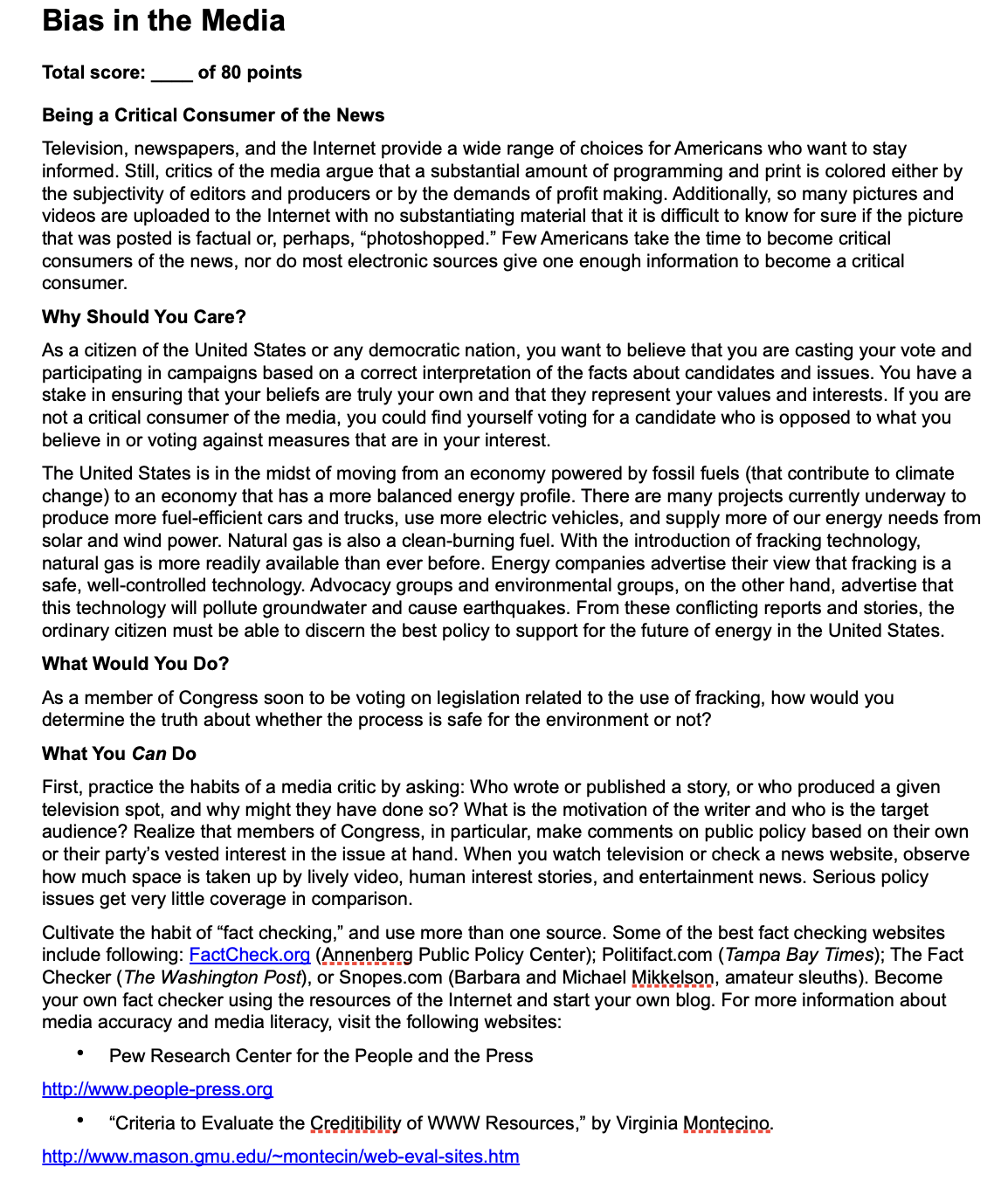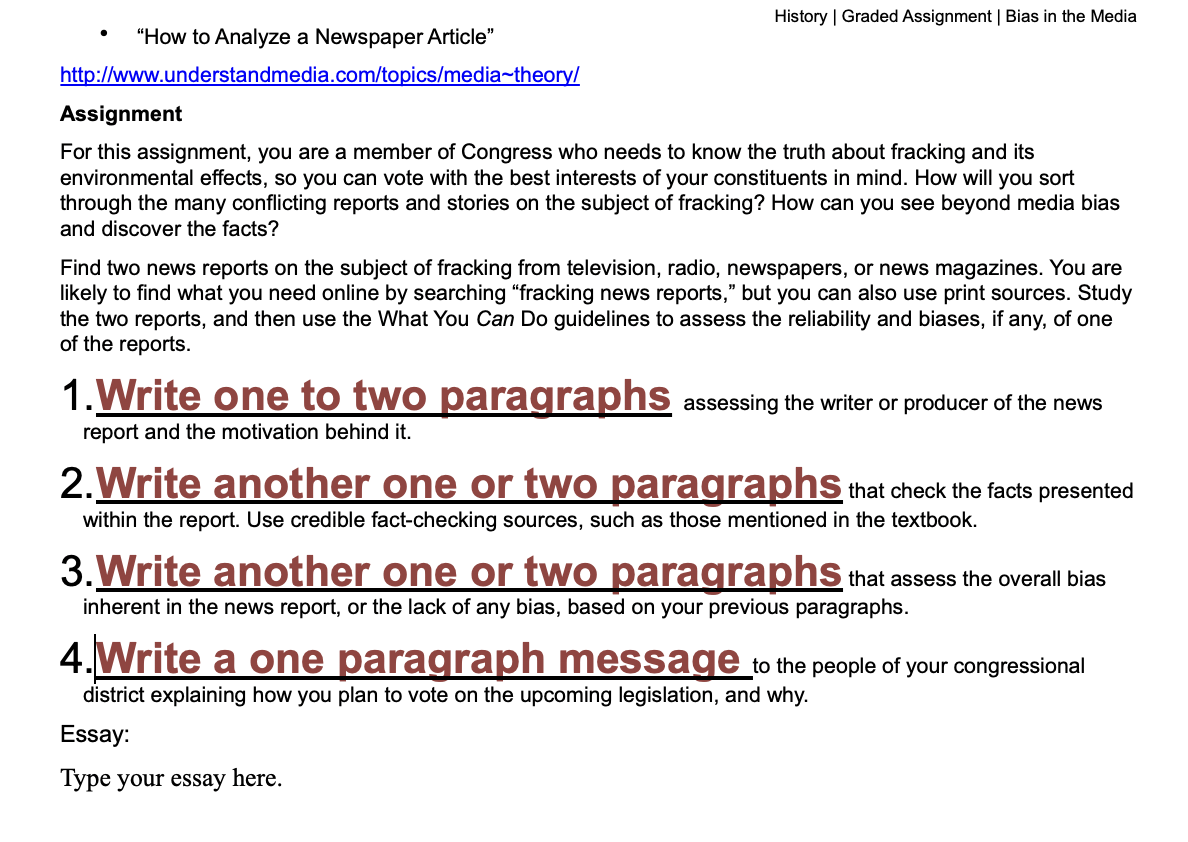Answered step by step
Verified Expert Solution
Question
1 Approved Answer
Bias in the Media Total score: of 80 points Being a Critical Consumer of the News Television, newspapers, and the Internet provide a wide


Bias in the Media Total score: of 80 points Being a Critical Consumer of the News Television, newspapers, and the Internet provide a wide range of choices for Americans who want to stay informed. Still, critics of the media argue that a substantial amount of programming and print is colored either by the subjectivity of editors and producers or by the demands of profit making. Additionally, so many pictures and videos are uploaded to the Internet with no substantiating material that it is difficult to know for sure if the picture that was posted is factual or, perhaps, "photoshopped." Few Americans take the time to become critical consumers of the news, nor do most electronic sources give one enough information to become a critical consumer. Why Should You Care? As a citizen of the United States or any democratic nation, you want to believe that you are casting your vote and participating in campaigns based on a correct interpretation of the facts about candidates and issues. You have a stake in ensuring that your beliefs are truly your own and that they represent your values and interests. If you are not a critical consumer of the media, you could find yourself voting for a candidate who is opposed to what you believe in or voting against measures that are in your interest. The United States is in the midst of moving from an economy powered by fossil fuels (that contribute to climate change) to an economy that has a more balanced energy profile. There are many projects currently underway to produce more fuel-efficient cars and trucks, use more electric vehicles, and supply more of our energy needs from solar and wind power. Natural gas is also a clean-burning fuel. With the introduction of fracking technology, natural gas is more readily available than ever before. Energy companies advertise their view that fracking is a safe, well-controlled technology. Advocacy groups and environmental groups, on the other hand, advertise that this technology will pollute groundwater and cause earthquakes. From these conflicting reports and stories, the ordinary citizen must be able to discern the best policy to support for the future of energy in the United States. What Would You Do? As a member of Congress soon to be voting on legislation related to the use of fracking, how would you determine the truth about whether the process is safe for the environment or not? What You Can Do First, practice the habits of a media critic by asking: Who wrote or published a story, or who produced a given television spot, and why might they have done so? What is the motivation of the writer and who is the target audience? Realize that members of Congress, in particular, make comments on public policy based on their own or their party's vested interest in the issue at hand. When you watch television or check a news website, observe how much space is taken up by lively video, human interest stories, and entertainment news. Serious policy issues get very little coverage in comparison. Cultivate the habit of "fact checking," and use more than one source. Some of the best fact checking websites include following: FactCheck.org (Annenberg Public Policy Center); Politifact.com (Tampa Bay Times); The Fact Checker (The Washington Post), or Snopes.com (Barbara and Michael Mikkelson, amateur sleuths). Become your own fact checker using the resources of the Internet and start your own blog. For more information about media accuracy and media literacy, visit the following websites: Pew Research Center for the People and the Press http://www.people-press.org "Criteria to Evaluate the Creditibility of WWW Resources," by Virginia Montecino. http://www.mason.gmu.edu/~montecin/web-eval-sites.htm "How to Analyze a Newspaper Article" http://www.understandmedia.com/topics/media-theory/ History | Graded Assignment | Bias in the Media Assignment For this assignment, you are a member of Congress who needs to know the truth about fracking and its environmental effects, so you can vote with the best interests of your constituents in mind. How will you sort through the many conflicting reports and stories on the subject of fracking? How can you see beyond media bias and discover the facts? Find two news reports on the subject of fracking from television, radio, newspapers, or news magazines. You are likely to find what you need online by searching "fracking news reports," but you can also use print sources. Study the two reports, and then use the What You Can Do guidelines to assess the reliability and biases, if any, of one of the reports. 1.Write one to two paragraphs assessing the writer or producer of the news report and the motivation behind it. 2.Write another one or two paragraphs that check the facts presented within the report. Use credible fact-checking sources, such as those mentioned in the textbook. 3.Write another one or two paragraphs that assess the overall bias inherent in the news report, or the lack of any bias, based on your previous paragraphs. 4.Write a one paragraph message to the people of your congressional district explaining how you plan to vote on the upcoming legislation, and why. Essay: Type your essay here.
Step by Step Solution
There are 3 Steps involved in it
Step: 1

Get Instant Access to Expert-Tailored Solutions
See step-by-step solutions with expert insights and AI powered tools for academic success
Step: 2

Step: 3

Ace Your Homework with AI
Get the answers you need in no time with our AI-driven, step-by-step assistance
Get Started


